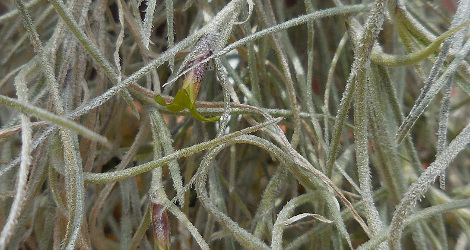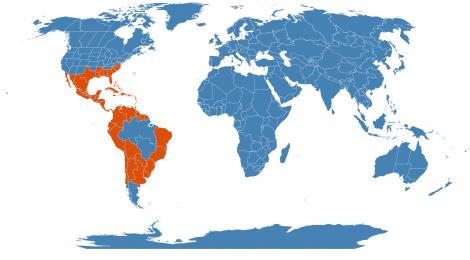Accession Data:
Tillandsia usneoides (L.) L.
subg. Diaphoranthema
- Common Name: Spanish Moss - fine form
- Family: Bromeliaceae Juss.
- Description: Fine-leaved, gracile Carribean form.
[syn. Renealmia usneoides L., Dendropogon usneoides (L.) Raf.]
Stems slender, branching, leafy, hanging, often to 20 feet or more, hoary-gray, festooned in masses over trees; leaves scattered, very narrowly linear, to 2 inches long; flowers small, pale green or blue, solitary in axils of leaves.
Florida to Texas, south to Argentina. Common on trees in southeastern US, where it is collected for use as a packing and stuffing material. Also commonly used in the floral trade.
- USDA Zone: 8-11
Accession Data:
- Accession # 199900306
- Source: Matt Opel
- Provenance: Wild collected in Dominican Republic, cuttings via Bird Rock Tropicals in California.
- Accession Date: 09-20-1999
- Bench: 3308 - NEOB: StarSteel 3x12
- Currently: active - healthy
- Qty: 2 confirmed on 07-09-2024
Classification:
- Division: Magnoliophyta
- Class: Liliopsida
- SubClass: commelinids
- Order: Poales
- SubOrder:
- Family: Bromeliaceae
- SubFamily: Tillandsioideae
- Tribe:
- SubTribe:
Flowering Data:
This accession has been observed in bloom on:| Year | Jan | Feb | Mar | Apr | May | Jun | Jul | Aug | Sep | Oct | Nov | Dec | ||||||||||||||||||||||||||||||||||||||||
|---|---|---|---|---|---|---|---|---|---|---|---|---|---|---|---|---|---|---|---|---|---|---|---|---|---|---|---|---|---|---|---|---|---|---|---|---|---|---|---|---|---|---|---|---|---|---|---|---|---|---|---|---|
| 2025 | ||||||||||||||||||||||||||||||||||||||||||||||||||||
| 2024 | ||||||||||||||||||||||||||||||||||||||||||||||||||||
| 2023 | ||||||||||||||||||||||||||||||||||||||||||||||||||||
| 2022 | ||||||||||||||||||||||||||||||||||||||||||||||||||||
| 2021 | ||||||||||||||||||||||||||||||||||||||||||||||||||||
| 2020 | ||||||||||||||||||||||||||||||||||||||||||||||||||||
| 2019 | ||||||||||||||||||||||||||||||||||||||||||||||||||||
| 2018 | ||||||||||||||||||||||||||||||||||||||||||||||||||||
| 2017 | ||||||||||||||||||||||||||||||||||||||||||||||||||||
| 2016 | ||||||||||||||||||||||||||||||||||||||||||||||||||||
| 2015 | ||||||||||||||||||||||||||||||||||||||||||||||||||||
References (internal):
- EEB Greenhouse Holdings native to: Texas / Alabama / Arkansas / Florida / Georgia / Louisiana / Mississippi / North Carolina / South Carolina / Virginia / Mexico Central / Mexico Northeast / Mexico Gulf / Mexico Northwest / Mexico Southwest / Mexico Southeast / Belize / Costa Rica / El Salvador / Guatemala / Honduras / Nicaragua / Panama / Bahamas / Bermuda / Cuba / Dominican Republic / Haiti / Jamaica / Leeward Is. / Puerto Rico / Trinidad-Tobago / Venezuelan Antilles / Windward Is. / French Guiana / Guyana / Suriname / Venezuela / Bolivia / Colombia / Ecuador / Peru / Brazil Northeast / Brazil Southeast / Brazil South / Argentina Northeast / Argentina Northwest / Chile Central / Chile North / Paraguay / Uruguay
References (external):
- The Plant List (2013). Version 1.1. Accessed 26 February 2015.
- WCSP (2015). World Checklist of Selected Plant Families. Facilitated by the Royal Botanic Gardens, Kew. Accessed 26 February 2015.
- Personal communication with Matt Opel, Sept 20, 1999
data regenerated on Tue, 20 May 2025 14:21:19 -0400 [bcm v4.0]
Images:

Additional images for this accession:
Click on thumbnails to enlargeCurrent Accessions in the Bromeliaceae
Subfamily Brochinioideae
Subfamily Bromelioideae
- Acanthostachys strobilacea


- Aechmea allenii

- Aechmea brevicollis


- Aechmea chantinii


- Aechmea fasciata


- Aechmea recurvata


- Ananas bracteatus `Striatus'

- Ananas comosus


- Billbergia distachia

- Billbergia lietzei


- Billbergia magnifica

- Billbergia nutans


- Billbergia porteana


- Billbergia pyramidalis



- Cryptanthus bivittatus


- Cryptanthus cf. seidelianus

- Neoregelia ampullacea

- Neoregelia carolinae


- Neoregelia cruenta

- Neoregelia lilliputiana

- Neoregelia spectabilis


- Neoregelia tigrina
- Neoregelia zonata

- Nidularium innocentii

- Nidularium microps

- Ochagavia carnea

- Portea petropolitana


Subfamily Hechtioideae
Subfamily Pitcairnioideae
- Deuterocohnia brevifolia


- Dyckia brevifolia


- Dyckia fosteriana

- Fosterella penduliflora

- Pitcairnia atrorubens


- Pitcairnia heterophylla


- Pitcairnia xanthocalyx

Subfamily Puyoideae
Subfamily Tillandsioideae
- Catopsis sp.

- Tillandsia albida

- Tillandsia albida

- Tillandsia baileyi

- Tillandsia brachycaulos

- Tillandsia bulbosa


- Tillandsia caerulea

- Tillandsia graomogolensis

- Tillandsia heteromorpha

- Tillandsia intermedia

- Tillandsia ionantha


- Tillandsia jonesii

- Tillandsia purpurea


- Tillandsia recurvata

- Tillandsia seleriana

- Tillandsia simulata

- Tillandsia simulata

- Tillandsia stellifera

- Tillandsia tectorum X paleacea
- Tillandsia tenuifolia Emerald Forest

- Tillandsia unidentified

- Tillandsia usneoides


- Tillandsia usneoides W/C


- Tillandsia usneoides W/C


- Tillandsia usneoides W/C


- Tillandsia xerographica


- Vriesea correia-araujoi

- Vriesea flammea

- Vriesea fosteriana

- Vriesea splendens

 = indicates flowering in past 14 days
= indicates flowering in past 14 days
 = images available for this accession
= images available for this accession
 = map available for this accession
= map available for this accession
 = accession added within past 90 days
= accession added within past 90 days



